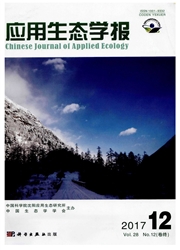

 中文摘要:
中文摘要:
对三江平原典型草甸和沼泽化草甸两个群落的优势植物小叶章的生物量、结构动态、不同生长阶段各器官的氮、磷含量和储量动态以及氮、磷养分限制状况进行了研究,结果表明,二着各器官生物量差异显著,但均符合模式Y=A+B1t+B2t2+B3t3;二者地上各器官生物量均为单峰型,且峰值出现的时间相差15d左右;F/C均小于1且前者明显大于后者;二者地上各器官的全氮和全磷含量在生长季均单凋下降,且叶〉叶鞘〉茎,根中全氮变化基本一致,但全磷变化差别很大;二者各器官“三氮”含量特别是NH4^+ -N和NO3^- -N含量变化较大,且NH4^+ -N/NO3^- -N〉1;根是二者氮、磷的重要储库,而茎、叶和叶鞘的氮、磷储量波动较大;两种小叶章的氮/磷〈14,表明氮是影响二者生长的限制性养分,但其对于前者的限制性程度要高于后者.
 英文摘要:
英文摘要:
Calamagrostis angustifolia is the dominant species in the typical meadow and marsh meadow communities of Sanjiang Plain. The study on its biomass structure and the N and P contents in its different organs showed that the biomass of different C. angustifolia organs in the two types of wetland communities was distinctly different, which could be described by Y= A + B1t + B2t2 + B3t3. The biomass of aboveground part and each organ presented single peak changing, with the maximum value of the latter occurred 15 d after. The F/C values were all less than 1, which was bigger in typical meadow than in marsh meadow. The total N and P contents in different organs of aboveground part all descended linearly in growth season, with the order of leaf 〉 vagina 〉 stem. The total N content in the roots of two C. angustifolia types was consistent, while that of total P was quite different. The contents of total N, NH4^+ -N and NO3^- -N, especially of NH4^+ -N and NO3^- -N, varied widely in different organs, with NH4^+ -N/NO3- -N〉1. Root was the important storage of N and P, but the storage of N and P in stem, leaf and vagina fluctuated greatly. The N/P ratios of two C. angustifolia types were all less than 14, which implied that N might be the limiting nutrient of C. angustifolia, and the limitation degree was higher in typical meadow than in marsh meadow.
 同期刊论文项目
同期刊论文项目
 同项目期刊论文
同项目期刊论文
 期刊信息
期刊信息
